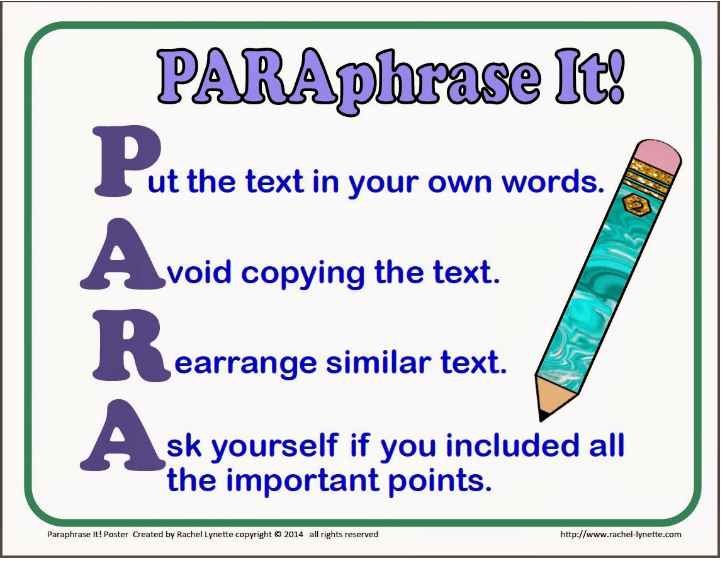Plagiarism
Avoid Plagiarism with... Paraphrasing
How to Paraphrase
When you paraphrase effectively, you are restating the writer’s words in your own words without condensing anything. Paraphrasing works well for discussing one point from an article or book. A good paraphrase is roughly equivalent in length to the original. The following strategy will help you:
1. Read the section carefully. Look up unfamiliar words.
2. Turn the original over and write down your understanding of the whole text. Consider beginning your paraphrase with the writer’s name, for example: In Talk, Marguerite Del Guidice argues that….
3. Reread the original and check your rephrasing for accuracy. Rearranging the writer’s words or leaving out/changing a few words is not paraphrasing.
4. Record the page number(s) for your in-text citation if required.
All paraphrases must be cited.
XXX
An example of Paraphrasing:
|
Original text from the Journal of Sport Management: One of the most contentious debates surrounding the indirect effects of athletics concerns its impact upon non-athletic gifts to universities. The major improvements of programs at Northwestern in 1995 and Georgia Tech in 1991 prompted speculation and some anecdotal evidence supporting the argument that athletic success contributes to additional general giving. However, this evidence and the proposition behind it has often met strong rebuttal. The reasons behind the challenges are easy to understand; the likely impacts of athletics on general giving are much harder to unambiguously assess than are the types of effects we have discussed to date (athletic department revenues and expenses, media coverage). Moreover, the cause-effect relationships can be quite ambiguous. Some benefactors are interested in both athletics and general university welfare but have a fixed amount of money they are willing to donate. In such cases, increased athletic success may help steer these donors toward athletic giving and away from general gifts. On the other hand, greater exposure for a university, whatever its source, may help spur giving across many fronts. The effect that is expected to dominate (athletic vs. general giving) cannot be theoretically determined. Comparisons across empirical studies are complicated by the use of different dependent variables, use of different variables to account for athletic success, different control variables, and a lack of investigation of lag relationships. For example, Baade and Sundberg (1996) try to explain gifts per alumni for 167 schools over an eighteen-year period, Grimes and Chressanthis (1994) consider annual gifts for one school over a thirty-year time frame, and McCormick and Tinsley (1990) estimate the relationship between athletic gifts and general giving. Even if effects are determined using comparable methods for different institutions, the answer as to whether athletic success and athletic giving reduce or increase general giving may depend on the specific university in question as well as the specific circumstances surrounding its athletic success (e.g., how "big" and how novel the success was.). Goff, Brian. "Effects Of University Athletics On The University: A Review And Extension Of Empirical Assessment." Journal Of Sport Management 14.2 (2000): 85. SPORTDiscus with Full Text. Web. 27 June 2014. |
Sample Paraphrasing of paragraph 2 above:
Goff (2000) points out that athletic success may initiate increased giving to the university as a whole, but some benefactors may only have an allotted amount of money for such purposes. In the event that a benefactor is equally interested in the university’s athletic achievements and the university as a whole, he or she could choose to donate money in either direction. Since the athletic success highlighted the athletic department, a benefactor could naturally gravitate toward furthering the success of that department. In contrast, the athletic success also reflected well on the university as a whole, and a benefactor could therefore choose to donate money to one or more university departments. The effect athletic success has on general giving is thus highly variable and difficult to study.
XXX
XXX
 Quick activities you can now do to practice this skill:
Quick activities you can now do to practice this skill:
Try practicing your paraphrasing by using the passages on this site. Once you have had a go, you can also check the suggested answers on the same site.
XXX
XXX
This page is reworked from: http://www.wcu.edu/WebFiles/PDFs/Avoiding-Plagiarism-2014.pdf
